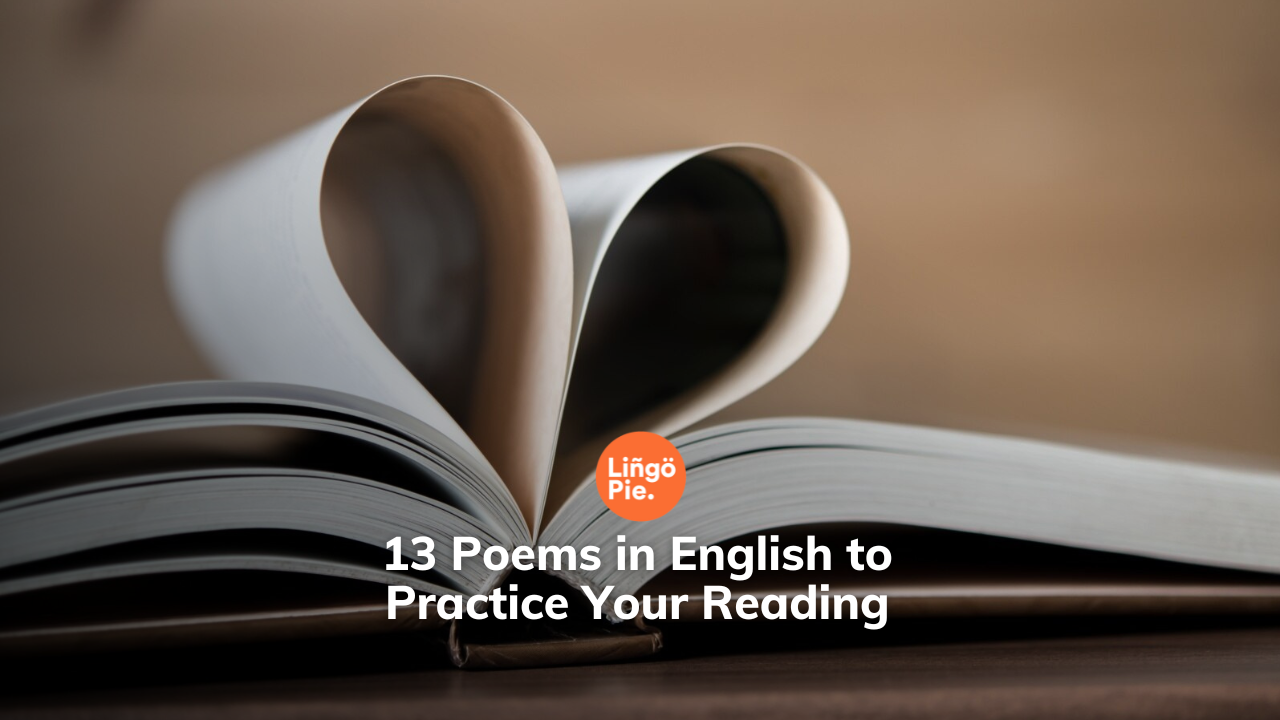In this article, we'll explore 13 poems that not only showcase the beauty of the language but also serve as excellent material for reading practice.
These timeless pieces not only captivate with their beauty of language but also provide invaluable material for honing reading proficiency.
Join us on a journey through the pages of literary history as we explore these masterpieces, perfect for both poetry enthusiasts and those eager to sharpen their reading skills.

13 Poems in English to Practice Your Reading
1. Sonnet 18 by William Shakespeare

William Shakespeare's timeless sonnet, "Sonnet 18" is one of the most famous poems in the English language and a staple in the world of poetry.
With its exquisite imagery and profound declaration of love, this poem is a must-read for any poetry enthusiast.
Shall I compare thee to a summer’s day?
Thou art more lovely and more temperate:
Rough winds do shake the darling buds of May,
And summer’s lease hath all too short a date:
Sometime too hot the eye of heaven shines,
And often is his gold complexion dimm’d;
And every fair from fair sometime declines,
By chance or nature’s changing course untrimm’d;
But thy eternal summer shall not fade
Nor lose possession of that fair thou ow'st;
Nor shall Death brag thou wander’st in his shade,
When in eternal lines to time thou growest:
So long as men can breathe or eyes can see,
So long lives this, and this gives life to thee.
Shakespeare used the language around him to coin new phrases and reimagine older idioms in a way that had a massive impact on the future of English by coining a number of popular expressions.
2. "O Captain! My Captain!" by Walt Whitman
"O Captain! My Captain!" is an extended metaphor poem penned by Walt Whitman in 1865, portraying the somber event of U.S. President Abraham Lincoln's passing ("O the bleeding drops of red, Where on the deck my Captain lies).
This poem garnered significant acclaim upon its release, marking Whitman's inaugural inclusion in anthologies and ranking as his most revered work during his lifetime. Alongside "When Lilacs Last in the Dooryard Bloom'd," "Hush'd Be the Camps To-day," and "This Dust was Once the Man," it constitutes one of Whitman's quartet of compositions devoted to Lincoln's demise.
3. "Ozymandias" by Percy Bysshe Shelley
"Ozymandias" is a sonnet crafted by the English Romantic poet Percy Bysshe Shelley (1792–1822).
Shelley composed this poem in a spirit of amicable rivalry with his friend and fellow poet Horace Smith (1779–1849).
"Ozymandias" delves into the transient nature of worldly affairs and the relentless march of time: it portrays how even the mightiest figures and the empires they erect are fleeting, destined to fade into obscurity as history unfolds.
No thing beside remains. Round the decay
Of that colossal wreck, boundless and bare
The lone and level sands stretch far away.
4. "No Man Is an Island" by John Donne

"No Man Is an Island" is a sonnet delving into the interconnectedness of humanity and the repercussions of loss. The speaker underscores that individuals are not solitary entities but rather integral components of the broader human community.
Drawing an analogy, the poem likens this collective to a continent, where each person constitutes a vital "piece" or "part" of the entirety.
Loss's impact is metaphorically compared to the erosion of land by the relentless sea, suggesting that the demise of even one individual diminishes the entire human race.
It ends with the famous lines:
Any man's death diminishes me,
Because I am involved in mankind.
And therefore never send to know for whom the bell tolls;
It tolls for thee.
5. "Still I Rise" by Maya Angelou
"You may write me down in history With your bitter, twisted lies..."
Maya Angelou's "Still I Rise" is a rallying cry for resilience and empowerment. With its defiant tone and uplifting message, this poem is a testament to the indomitable human spirit.
Does my haughtiness offend you?
Don’t you take it awful hard
’Cause I laugh like I’ve got gold mines
Diggin’ in my own backyard.
6. "We Real Cool" by Gwendolyn Brooks
"We Real Cool" is a poem by Gwendolyn Brooks, written in 1959. Often hailed as a prominent example of jazz poetry, the poem consists of four verses, each comprising two rhyming lines, with the repeated word "we" in most lines.
Through the portrayal of youthful rebellion and bravado, the poem offers a stark commentary on the consequences of risky behavior and societal pressures.
We real cool. We
Left school. We
Lurk late. We
Strike straight. We
Sing sin. We
Thin gin. We
Jazz June. We
Die soon.
7. "Stopping by Woods on a Snowy Evening" by Robert Frost
"Whose woods these are I think I know. His house is in the village though..."
Robert Frost's evocative poem, "Stopping by Woods on a Snowy Evening," invites readers into a tranquil, wintry landscape.
The woods are lovely, dark and deep,
But I have promises to keep,
And miles to go before I sleep,
And miles to go before I sleep.
8. "The Road Not Taken" by Robert Frost
"Two roads diverged in a yellow wood, And sorry I could not travel both..." Another gem by Robert Frost, "The Road Not Taken," explores themes of choice, regret, and the passage of time.
Its thought-provoking narrative and timeless message make it a favorite among readers of all ages.
Two roads diverged in a wood, and I—
I took the one less traveled by,
And that has made all the difference.
9. "I, Too" by Langston Hughes
"I, too, sing America. I am the darker brother..."
Langston Hughes, a towering figure of the Harlem Renaissance, penned this powerful poem, "I, Too," which speaks to the struggles and resilience of African Americans in the face of adversity.
Its poignant imagery and unwavering hope resonate deeply with readers.
10. "Because I could not stop for Death" by Emily Dickinson

This lyrical poem offers readers a glimpse into the poet's contemplation of the afterlife. Its haunting imagery and introspective tone make it a captivating read.
Death is personified as a youthful companion accompanying her in a carriage as she journeys towards the afterlife. Along the way, the poet reflects on her past life, sharing glimpses of her experiences while still alive.
Because I could not stop for Death –
He kindly stopped for me –
The Carriage held but just Ourselves –
And Immortality.
11. "The Raven" by Edgar Allan Poe
"The Raven" is a narrative poem and a haunting tale of loss, mourning, and the descent into madness.
Its eerie atmosphere and musical rhythm captivate readers, making it a quintessential piece of Gothic literature. It is also often quoted in popular culture.
The mourner, frequently portrayed as a scholar, expresses sorrow over the absence of his beloved, Lenore. Perched atop a bust of Pallas, the raven exacerbates the protagonist's anguish by incessantly repeating the word "Nevermore."
Once upon a midnight dreary, while I pondered, weak and weary,
Over many a quaint and curious volume of forgotten lore—
While I nodded, nearly napping, suddenly there came a tapping,
As of some one gently rapping, rapping at my chamber door.
"'Tis some visiter," I muttered, "tapping at my chamber door—
Only this and nothing more.
12. "Do Not Go Gentle into That Good Night" by Dylan Thomas
This poem in the form of a villanelle by Welsh poet Dylan Thomas urges readers to embrace life's challenges and resist passivity in the face of mortality.
It has been suggested that the poem was written for Thomas's dying father.
It is one of the most famous poems written in English and its passionate plea and rhythmic repetition make it a memorable piece of poetry.
And you, my father, there on the sad height,
Curse, bless, me now with your fierce tears, I pray.
Do not go gentle into that good night.
Rage, rage against the dying of the light.
13. "Frost at Midnight" by Samuel Taylor Coleridge
"Frost at Midnight," written by Coleridge in February 1798, forms a part of the conversation poems. This poetic piece delves into Coleridge's early life experiences with a tint of negativity, highlighting the importance of rural upbringing.
It echoes the longing for his son, Hartley, to relish a childhood distinct from his own, one deeply entrenched in nature, fostering the hope that Hartley would emerge as an authentic "child of nature."
For I was reared
In the great city, pent 'mid cloisters dim,
And saw nought lovely but the sky and stars.
But thou, my babe! shalt wander like a breeze
By lakes and sandy shores, beneath the crags
Of ancient mountain, and beneath the clouds
The Power of Poetry in Enhancing Reading Skills
Engaging with poems serves as a potent tool for enhancing a learner's reading skills in English.
The condensed yet rich language of poetry provides an opportunity for learners to delve into intricate vocabulary, varied sentence structures, and nuanced meanings.
Moreover, learning a poem by heart, a practice beneficial even beyond elementary school, offers a unique exercise in memory retention and oral fluency for adult English learners as well.
Furthermore, comparing and contrasting poems with short stories enriches learners' understanding of literary forms and encourages critical thinking.
Through the exploration of favorite poems and the memorization of verses, learners of all ages can sharpen their reading abilities and develop a profound appreciation for the artistry of language.
Summing Up: English Poems to Practice Your Reading
These 13 poems represent just a fraction of the rich tapestry of poetry available to readers. Whether you're drawn to the timeless sonnets of William Shakespeare, the contemplative verses of Emily Dickinson, or the evocative imagery of Langston Hughes, there's a poem out there for every taste and inclination.
So take a moment to savor the beauty of language, and let these poems ignite your imagination and deepen your reading skills.
And for those eager to further immerse themselves in the English language, consider signing up for a 7-day trial with Lingopie.
With Lingopie's immersive language learning platform, you can deepen your understanding of English while enjoying captivating content.
FAQs
Here, we provide answers to common questions that people ask about poems for English learners, and how they can improve reading skills.
What is the most beautiful short poem ever written?
It's subjective, but many consider "The Road Not Taken" by Robert Frost or "If" by Rudyard Kipling as among the most beautiful short poems.
What is a short simple poem?
A short simple poem is one that conveys a message or emotion succinctly in a few lines, such as haikus or limericks.
What are some famous poems?
"The Raven" by Edgar Allan Poe, "Sonnet 18" by William Shakespeare, and "The Waste Land" by T.S. Eliot are some of the most famous poems written in English.
What is the name of the most famous poem in English literature?
The most famous poem in English literature is often considered to be "Sonnet 18" by William Shakespeare, also known as "Shall I Compare Thee to a Summer's Day?"






![Improve Your English Listening Comprehension [2025 Guide]](/blog/content/images/size/w300/2023/12/5D8A320F-7EF3-4F0F-9EDD-0F91C9504FA0.png)
![4 Hacks to Learn English With Movies [2025 Guide]](/blog/content/images/size/w300/2023/10/88AAD01A-8BF3-4648-82CC-639C1B240C28.png)

![How To Learn English With Sitcoms: 5 Easy Ways [Guide]](/blog/content/images/size/w300/2023/09/94E050B7-BD8B-4659-B6E5-B5996E461FC8.png)